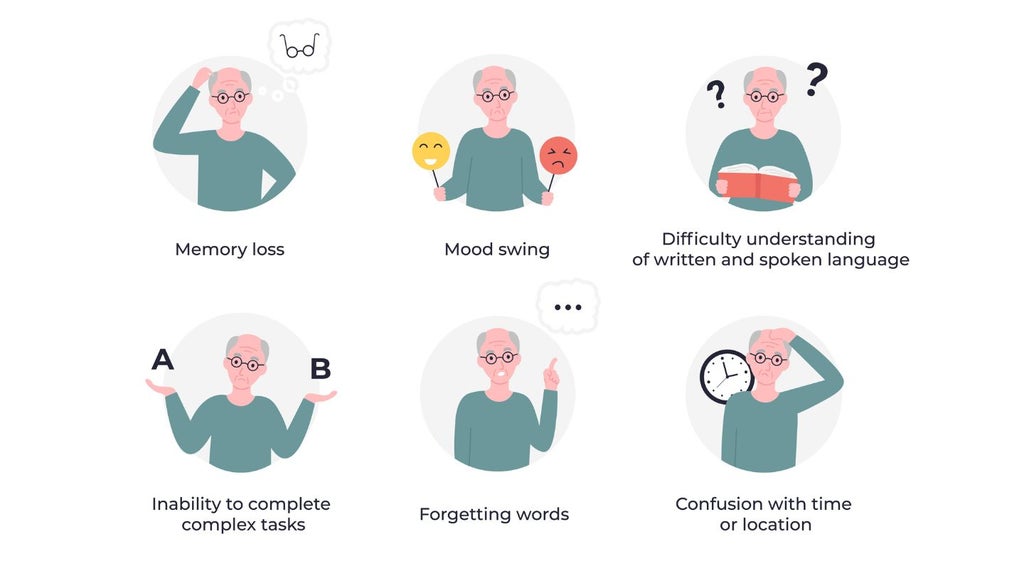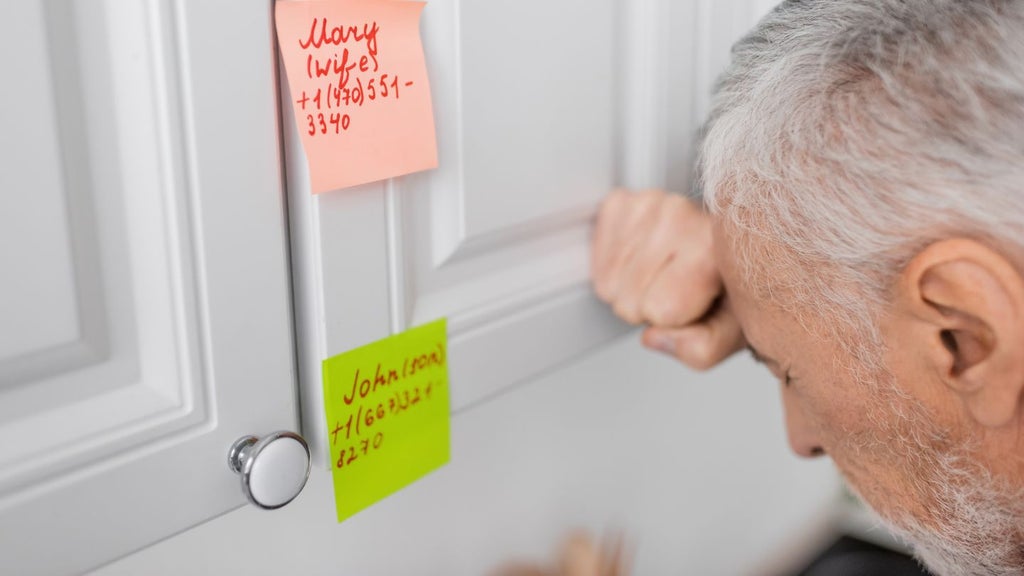Memory is a fundamental aspect of human cognition, enabling us to store, retrieve, and utilize information throughout our lives. It allows us to navigate our daily routines, maintain relationships, and retain our sense of identity. However, as we age or face certain health conditions, memory loss can become a source of concern, affecting our independence and quality of life.
This comprehensive guide delves into the intricacies of memory loss, exploring its causes, symptoms, diagnosis, and treatment options. We'll also provide practical tips for coping with memory loss and maintaining cognitive health. Whether you're concerned about your own memory function or seeking to support a loved one, numerous resources and support services are available to help you cope with memory loss and maintain a good quality of life.
Symptoms of Memory Loss
Occasional forgetfulness is a normal part of life, especially as we age. However, persistent and progressive memory loss may indicate a more serious underlying condition. Here are some common symptoms of memory loss:
Forgetfulness of Recent Events or Conversations
Individuals with memory loss may experience difficulty remembering recent events, conversations, or appointments. They may forget what they had for breakfast, what they talked about with a friend just a few minutes ago, or when their next doctor's appointment is scheduled. This type of forgetfulness is often a sign of early-stage memory loss.
Repeating Questions or Stories
Repetition is a common symptom. Individuals may repeatedly ask the same questions, tell the same stories multiple times, or forget that they have already shared information. This repetitive behavior can be frustrating for both the individual and their loved ones.
Misplacing Personal Belongings
Frequently misplacing personal belongings, such as keys, wallets, glasses, or phones, can also be a sign of memory loss. Individuals may forget where they placed items, retrace their steps repeatedly, or even accuse others of taking their belongings.
Forgetting Appointments or Social Engagements
Difficulty remembering appointments, social engagements, or family gatherings can significantly disrupt daily life. Individuals may miss important events, show up late, or forget altogether. This can lead to social isolation and embarrassment.
Difficulty Learning New Information or Following Instructions
Struggling to learn new information or follow multi-step instructions can also indicate memory loss. Individuals may need help understanding new concepts, remembering new names, or completing tasks that require multiple steps.
Disorientation in Familiar Surroundings
Getting lost in familiar places, such as one's own home or neighborhood, can be a concerning symptom of memory loss. Individuals may need to remember their way around, confuse rooms in their house, or help finding their way back home from familiar errands.
Mood Changes and Personality Shifts
Memory loss can also manifest in mood changes and personality shifts. Individuals may become more irritable, anxious, or withdrawn. They may experience mood swings, lose interest in activities they once enjoyed, or exhibit social withdrawal.
It's important to note that occasional forgetfulness does not necessarily indicate a serious problem.
However, if you are experiencing persistent or progressive memory loss, it's crucial to consult a healthcare professional for proper evaluation and diagnosis. Early intervention can make a significant difference in managing memory loss and maintaining quality of life.

Causes of Memory Loss
Memory loss can stem from a variety of factors, ranging from normal aging processes to underlying medical conditions. Here's an overview of common causes:
Normal Age-Related Memory Changes
As we age, our brains undergo changes that can affect memory function. These changes include a decrease in the production of new brain cells and a loss of connections between existing cells.
While occasional forgetfulness is common in older adults, significant memory loss may warrant further evaluation.
Dementia
Dementia is a general term for a decline in cognitive abilities, including memory, severe enough to interfere with daily life. Alzheimer's disease is the most common cause of dementia, accounting for 60-80% of cases. Other causes include vascular dementia, frontotemporal dementia, and Lewy body dementia.
♦ Alzheimer's Disease: Alzheimer's disease is a progressive neurodegenerative disorder and the most common cause of dementia, affecting millions of people worldwide. It’s characterized by a gradual decline in cognitive function, including memory, language, thinking skills, and eventually, the ability to perform everyday tasks. Alzheimer's disease typically affects older adults, but onset can occur as early as the mid-30s.
♦ Vascular Dementia: Vascular dementia is the second most common cause of dementia, accounting for about 10-15% of cases. It’s caused by damage to blood vessels in the brain, which can restrict blood flow and oxygen supply to brain cells. This damage can lead to memory loss and difficulty with everyday activities.
♦ Lewy Body Dementia: Lewy body dementia is the third most common cause of dementia, accounting for about 5-10% of cases. It is characterized by the accumulation of protein deposits called Lewy bodies in the brain cells. These deposits can lead to memory loss, hallucinations, movement problems, and sleep disturbances.
♦ Frontotemporal Dementia: Frontotemporal dementia is a group of disorders that affect the frontal and temporal lobes of the brain. These lobes are responsible for personality, language, and behavior. Frontotemporal dementia can cause changes in personality, social behavior, language, and decision-making.
Other Neurological Conditions
♦ Traumatic Brain Injury: Traumatic brain injury, such as a concussion or skull fracture, can cause memory loss, especially if the injury is severe. The severity of memory loss depends on the location and extent of the damage.
♦ Stroke: A stroke is a sudden loss of blood flow to the brain, which can damage brain cells and lead to memory loss. The severity of memory loss depends on the location and extent of the brain damage.
♦ Multiple Sclerosis: Multiple sclerosis is an autoimmune disease that affects the central nervous system, including the brain. It can cause a variety of symptoms, including memory loss, difficulty with concentration, and fatigue.

Vitamin Deficiencies
Deficiencies in certain vitamins, such as vitamin B12 and folate, can cause memory loss. Vitamin B12 is essential for producing red blood cells and plays a role in nerve function. Folate is important for DNA synthesis and brain function.
While vitamin B6 deficiency is not the sole cause of memory loss, it is a recognized contributor to cognitive decline.
Ensuring adequate vitamin B6 intake through a balanced diet or supplementation can help maintain brain health and protect against memory loss, and addressing vitamin deficiencies with supplements can often support overall memory function.
Depression
Depression is a common mental health concern that can cause a variety of symptoms, including memory loss.
People with depression may have difficulty concentrating, remembering recent events, or making decisions. Treating depression can often improve memory function.
Medications
Certain medications, particularly those used to treat anxiety, depression, and pain, can have side effects that include memory loss. Consult your doctor or pharmacist if you're concerned about potential medication-induced memory problems.
Please note that this is not an exhaustive list of all possible causes of memory loss. If you are experiencing memory loss, it’s important to consult a healthcare professional for an accurate diagnosis and appropriate treatment.
When to See a Doctor
If you're experiencing persistent or progressive memory loss, it's essential to consult a healthcare professional who specializes in cognitive health.
Early diagnosis and intervention can improve outcomes and provide support for both individuals and their caregivers. Don't hesitate to seek medical attention if you have concerns about your memory function.
While occasional forgetfulness can be a normal part of aging, persistent or progressive memory loss can be a sign of an underlying medical condition. Here are some specific situations that warrant seeking medical attention:
Interference with Daily Activities: If memory loss is interfering with your ability to perform your daily activities, such as managing finances, preparing meals, or taking care of yourself, it's crucial to seek medical evaluation. These difficulties can indicate a more serious underlying condition that requires proper management.
Sudden Onset of Memory Loss: If you experience a sudden onset of memory loss, especially if it is accompanied by other neurological symptoms, it's essential to seek immediate medical attention. This could be a sign of a stroke, brain injury, or other urgent medical condition.
Unexplained Accompanying Symptoms: Memory loss often occurs alongside other symptoms, such as confusion, personality changes, mood swings, or difficulty with coordination. If you're experiencing memory loss in conjunction with these unexplained symptoms, it's important to consult a healthcare professional to rule out potential underlying medical conditions.
Early diagnosis of memory loss is crucial for several reasons:
♦ Identifying the Underlying Cause: Proper evaluation and diagnosis can help determine the underlying cause of your memory loss, whether it's normal aging, a vitamin deficiency, a medication side effect, or a more serious medical condition.
♦ Guiding Treatment Options: Once the cause is identified, appropriate treatment options can be pursued. Treatment may involve lifestyle modifications, medication adjustments, cognitive rehabilitation, or addressing underlying medical conditions.
♦ Providing Support and Resources: Early diagnosis allows individuals and their caregivers to access necessary support services, educational resources, and emotional support groups to cope with memory loss and improve quality of life.
Remember, you're not alone in facing memory loss. Don't hesitate to seek medical help to address your concerns and take steps towards managing memory loss effectively.
Diagnosing Memory Loss
Consulting a healthcare professional is crucial for obtaining an accurate diagnosis and appropriate treatment. The diagnostic process typically involves a comprehensive evaluation that encompasses medical history, physical examination, cognitive testing, and sometimes, imaging studies.
Medical History and Physical Exam
The initial step in diagnosing memory loss involves a thorough medical history review. Your doctor will inquire about your current symptoms, past medical conditions, medications, family history, and lifestyle habits. This information provides valuable clues about potential underlying causes.
A physical examination follows, including an assessment of your neurological function, such as reflexes, coordination, and muscle strength. This evaluation can help identify signs of neurological disorders that may contribute to memory loss.
Cognitive Testing
To assess your cognitive abilities, your doctor may administer standardized cognitive tests. These tests evaluate various aspects of memory, such as short-term and long-term recall, language, attention, and executive functioning. The results of these tests help determine the severity and pattern of your memory loss.
Blood Tests
Blood tests play a crucial role in ruling out potential medical conditions that can cause memory loss, such as vitamin deficiencies, thyroid disorders, or liver dysfunction. These tests provide valuable information about your overall health and identify any underlying medical concerns.
Neuroimaging Studies
In some cases, neuroimaging studies, such as CT scans or MRI scans, may be ordered to visualize the structure of your brain. These images can help detect abnormalities, such as strokes, tumors, or brain atrophy, which may contribute to memory loss.
Mental Health Evaluation
A psychological evaluation assesses your overall mental state, including your mood, thoughts, and behavior. This evaluation can help rule out psychiatric conditions, such as depression or anxiety, which can mimic or exacerbate memory problems.
The diagnostic process for memory loss is a collaborative effort between you, your doctor, and possibly other healthcare professionals. By carefully evaluating your symptoms, history, and test results, the underlying cause of your memory loss can be identified, paving the way for appropriate treatment and support.
Treatment for Memory Loss
Treatment for memory loss depends on the underlying cause.
For Alzheimer's disease and other dementias, while there is no cure, medications can help manage symptoms and slow the progression of the disease.
Lifestyle modifications, such as regular exercise, a healthy diet, and cognitive stimulation, can also promote brain health and potentially delay the onset of memory decline.
Medications for Alzheimer's and Dementia
While there is no cure for Alzheimer's disease, medications can help manage symptoms and slow the progression of the disease. These medications work by increasing the levels of acetylcholine, a neurotransmitter that plays a role in memory and thinking. Two classes of medications are commonly used for Alzheimer's disease:
♦ Cholinesterase inhibitors: These medications prevent the breakdown of acetylcholine, thereby increasing its levels in the brain.
♦ NMDA receptor antagonists: These medications work by blocking NMDA receptors, which are involved in excitotoxicity, a process that can damage brain cells.
It's important to note that medications for Alzheimer's disease do not cure the disease and may not be effective for everyone. They may also cause side effects, such as nausea, vomiting, and diarrhea.

Supplements
Memory loss can sometimes be caused by vitamin deficiencies, such as vitamin B12 deficiency or folate deficiency. Folate is abundant in leafy greens and legumes or can be taken as a supplement and has been shown to slow down age-related memory and cognitive decline. Other compounds that have demonstrated potential cognitive benefits include:
♦ Bacopa monnieri: This herb contains bacosides, compounds that have shown promise in supporting memory function.
♦ Phosphatidylserine: A naturally occurring phospholipid involved in cell membrane function, phosphatidylserine facilitates communication within brain cells, potentially enhancing memory and cognitive performance.
♦ Grape Extract: Rich in antioxidants, grape extract has been clinically linked to improvements in attention, language, and immediate and delayed memory. It may also support mood in healthy older adults.
♦ Green Tea Leaf Extract: Known for its antioxidant properties, green tea leaf extract may help enhance attention.
♦ Vitamin B6: Involved in the production of neurotransmitters, vitamin B6 helps maintain normal levels of homocysteine, an amino acid in the blood that, when elevated, can increase the risk of various health concerns.
Please note that these supplements should be considered alongside a healthy lifestyle, which includes a balanced diet, regular exercise, and adequate sleep. And of course, it’s always crucial to consult with a healthcare professional before starting any new supplements, especially if you are taking any medications or have any underlying health conditions.
Cognitive Rehabilitation and Training
Cognitive rehabilitation and training programs can help improve memory function in people with memory loss.
These programs typically involve activities that focus on specific cognitive skills, such as memory, attention, and language.
Cognitive rehabilitation and training can be beneficial for people with Alzheimer's disease, dementia, and other conditions that affect memory.
Lifestyle Changes to Support Brain Health
Several lifestyle changes can promote brain health and potentially delay the onset of memory decline. These include:
♦ Regular exercise: Exercise has been shown to improve cognitive function and reduce the risk of dementia. Aim for at least 30 minutes of moderate-intensity exercise most days of the week.
♦ Healthy diet: A healthy diet that is rich in fruits, vegetables, and whole grains can help protect brain health. Limit processed foods, sugary drinks, and unhealthy fats.
♦ Cognitive stimulation: Engage in activities that keep your mind active, such as reading, puzzles, and learning new skills.
♦ Quality sleep: Getting enough sleep is essential for brain health. Aim for 7-8 hours of sleep each night.
♦ Social interaction: Staying socially connected can help protect brain health. Make time for social activities with friends and family.
♦ Stay hydrated: Studies have shown that even mild dehydration can impair cognitive performance, making it difficult to focus, learn, and make decisions. Aim to drink plenty of water throughout the day, even if you don't feel thirsty.
Caregiver Education and Support Strategies
Caring for someone with memory loss can be challenging. There are a number of resources available to help caregivers, including:
♦ Support groups: Support groups can provide caregivers with emotional support and practical advice.
♦ Educational resources: Many educational resources about memory loss and caregiving are available.
♦ Respite care: Respite care provides caregivers with a break from their caregiving responsibilities.
You can often find information about these resources at your local social services office, online or in person, or at a nearby medical center. It's important for caregivers to take care of themselves as well. This includes getting enough sleep, eating a healthy diet, and exercising regularly. Caregivers should also make time for activities that they enjoy.

Coping with Memory Loss
While memory loss can be a challenging and often frustrating experience, there are a number of strategies that individuals and their caregivers can implement to cope effectively and maintain a good quality of life. Here are some helpful tips:
Organizing Life and Managing Forgetfulness
♦ Maintain a structured routine: Establishing a regular daily routine can provide a sense of predictability and stability, which can be particularly beneficial for individuals with memory loss. Stick to consistent times for waking up, meals, medications, and bedtime. Use visual aids like calendars, to-do lists, and reminders to keep track of appointments, tasks, and important information.
♦ Create a memory-friendly environment: Organize your living space in a way that makes it easy to find everyday items. Keep things in designated places and label shelves, drawers, and cabinets clearly. Ensure adequate lighting and reduce clutter to minimize distractions and potential hazards.
♦ Utilize memory aids: Employ various memory aids to assist with recall and reduce the burden on your memory. Keep a notebook handy to jot down important information, such as appointments, shopping lists, and medication schedules. Use sticky notes to label items around the house or reminders on the refrigerator.
♦ Engage in cognitive stimulation: Regularly engage in activities that stimulate your mental faculties and keep your mind active. Puzzles, brain games, reading, learning new skills, and creative pursuits can help maintain cognitive function and potentially slow the progression of memory loss.
Maintaining Quality of Life and Relationships
♦ Maintain a healthy lifestyle: Adopt healthy lifestyle habits to promote overall well-being and support brain health. Engage in regular physical exercise, consume a balanced diet rich in fruits, vegetables, and whole grains, and get adequate sleep. Avoid excessive alcohol consumption and smoking, as these can negatively impact cognitive function.
♦ Seek social support: Maintain strong social connections and engage in regular social activities. Social interaction can help reduce stress, improve mood, and provide a sense of belonging. Join support groups or connect with friends and family members who can offer understanding and companionship.
Resources for Caregivers
♦ Utilize Resources: Caregivers play a crucial role in supporting individuals with memory loss. Caregivers should educate themselves about the condition, seek support groups for caregivers, and explore respite care options to allow for breaks from their caregiving responsibilities.
♦ Seek professional help: Don't hesitate to seek professional help from a healthcare provider if you are experiencing memory loss. Early diagnosis and intervention can lead to better management of symptoms, support for both individuals and caregivers and access to appropriate treatment options.
The Bottom Line
Memory loss can be a complex and concerning issue, affecting individuals and their families in profound ways. Memory loss can stem from a variety of factors, ranging from normal aging processes to underlying medical conditions, so early diagnosis is crucial.
Treatment for memory loss depends on the underlying cause. Medications can help manage symptoms and slow the progression of the disease. Lifestyle modifications, such as regular exercise, healthy amounts of sleep, a healthy diet, proper nutritional supplementation, along with cognitive stimulation, can promote brain health and potentially delay the onset of memory decline.
While memory loss can present challenges, there is hope for continued progress in understanding and managing this condition. Ongoing research is focused on developing new treatments and interventions to prevent, slow, or even reverse memory loss.
Remember, if you are experiencing memory loss, you’re not alone. Numerous resources and support services are available to help you cope with memory loss and maintain a good quality of life. Consult with your healthcare provider, seek support groups, and explore lifestyle changes that promote brain health.








